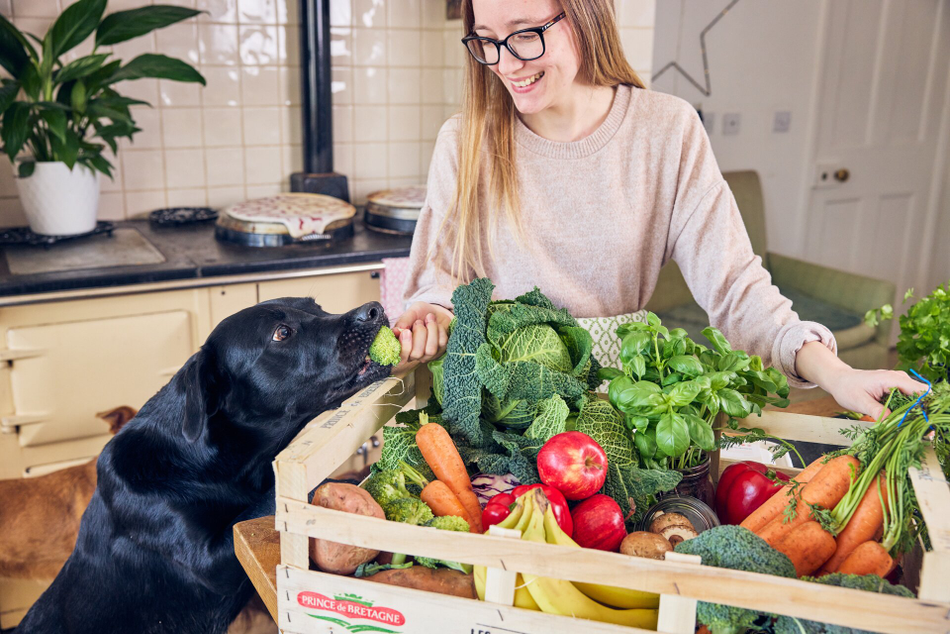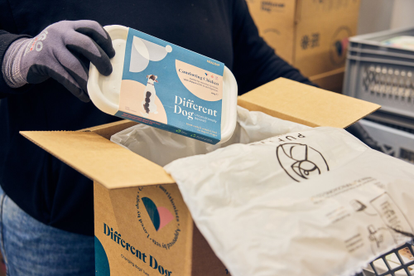

Labrador retrievers are friendly & good natured family dogs. Learn about their temperament, lifespan, grooming, feeding & more in our expert guide.
Our food is approved & verified by our in-house veterinarian, canine nutritionist and behaviourist.
What is one of the most common dog breeds obsessed with Different Dog's freshly cooked food? Drumroll, please…
IT’S LABRADORS!
Known for their loyalty, intelligence, and friendly nature, Labrador Retrievers are among the most cherished dog breeds worldwide, embodying the true spirit of man's best friend.
Read on to learn more about what makes labs great pets and why so many labrador owners choose our freshly cooked diet.

Lab History: What Were Labradors Bred For?
Named after the Labrador region in Canada, labs have a rich history that dates back to the early 19th century in Newfoundland. Initially bred as water dogs, their primary role was to help fishermen by retrieving fish that escaped from hooks and nets.
Their strong swimming ability, webbed paws, and thick, water-resistant coat made them exceptionally skilled at this task.
It wasn’t long until these diligent workers captured the hearts of the English who visited Canada, leading to their transportation to Britain where they transitioned from water to land, becoming esteemed gun dogs. Their keen sense of smell, gentle mouth for retrieving game birds without damage, and eagerness to please made them unparalleled companions for hunters.
Over the years, Labradors have adapted to various roles and today, they are celebrated not only as beloved family pets but also as guide dogs for people who are visually impaired, assistance dogs for those living with disabilities, and in search and rescue missions.
Labrador Retriever Facts
Life expectancy: 10-12 years
Average full-grown height: 55-62 cm
Average weight: 25-36 kg
Coat Type: Short, dense, water-resistant
Coat Colour: Black, yellow, chocolate, red
Temperament: Friendly, outgoing, and high-spirited companions who have more than enough affection to go around for a family looking for a medium-to-large dog.
Hypoallergenic: No
Origin: Newfoundland
Types of Labs: English vs. American Labrador
As mentioned, Labrador Retrievers are a very popular choice for the family pet, renowned for their loyalty, intelligence, and versatility. However, what many may not realise is that you have a choice between two distinct types of Labradors: the English and the American Labrador.
The English Labrador, often referred to as the ‘show’ or ‘bench’ Labrador has a broader build, shorter legs, and a more pronounced head. These Labs are typically calmer and more docile in temperament, making them excellent family pets.
On the other hand, the American Labrador is bred primarily for fieldwork and sports, making them generally leaner, with longer legs and a more streamlined head. They are known for their high energy levels and athletic ability, making them perfect companions for outdoor adventures and activities such as hunting and field trials.
Despite these differences, both types of Labradors share the breed's hallmark traits of friendliness, trainability, and a love for being part of the family. So, whether you choose an English or an American Labrador, you're guaranteed a loyal and loving companion for life.
Labrador Shedding: Are Labs Hypoallergenic?
Although often short-haired, Labradors are not hypoallergenic as they shed throughout the year, with a significant increase during the spring and fall as they prepare for the changing seasons. This means that they are not the best choice for allergy sufferers, as their shedding can distribute pet dander, a common allergen, throughout the home.
Labrador Retriever Temperament and Personality
Labrador Retrievers are loyal, intelligent, playful and friendly dogs, giving them an excellent temperament and personality. Being equally adept at warming laps as they are at retrieving in the field (aka. bringing that tennis ball back!), makes labs an all-round family favourite.
They possess an innate eagerness to please, are intelligent and love to learn, meaning that they respond well to positive reinforcement training. If that wasn’t enough, their friendly nature means they get along famously with children and other animals, making them the perfect addition to any family.
Labrador Grooming
Labrador Retrievers have short, dense coats that require regular grooming to maintain their health and appearance. Despite their less complex coats compared to breeds like Cavapoos, Labradors do shed, especially during seasonal changes.
Regular grooming is essential in managing malting, helping to remove loose hair and keeping their coat clean and fresh. Their coats can be easily managed by weekly brushing with a firm bristle brush or a de-shedding tool. This not only helps in distributing natural oils throughout their coat, keeping it shiny and healthy but also minimises the amount of hair left around the home.
While they may not need professional grooming as frequently as other breeds, Labradors do benefit from occasional baths to keep them smelling fresh—though it’s important not to over-bathe, as this can strip their coat of natural oils.
Don’t forget about their nails, ears, and teeth. Regular nail trimming prevents discomfort and mobility issues while cleaning their ears when required can ward off infections. Additionally, dental care with brushes or specially designed chews (have you tried our delicious Pizzles?) will keep their teeth strong and healthy.

How Much Exercise Do Labradors Need?
Labrador Retrievers are known for their energy and enthusiasm and require regular exercise to keep them happy and healthy.
An adult Labrador typically requires at least an hour of physical activity daily. This can include a mix of walks, playtime, and other activities like swimming, which Labs particularly enjoy,
Labrador puppies, however, require less exercise. Whilst they require lots of socialisation and playtime, it’s very important to bear in mind that their bodies are still developing, and too much exercise can strain their joints and potentially lead to long-term health issues.
A good rule of thumb for puppies is five minutes of exercise per month of age, twice a day until they are fully grown. However, it’s important to remember that all puppies are different so this is not a one-size-fits-all formula.
Common Labrador Health Issues
Like all breeds, Labradors are prone to certain health issues. Being aware of these common conditions can help owners seek timely veterinary care and potentially prevent more serious complications.
Some of the health issues commonly seen in Labradors include:
- Hip Dysplasia: A genetic condition where the hip joint doesn't fit together perfectly, which can lead to arthritis and pain.
- Elbow Dysplasia: Similar to hip dysplasia, but affects the elbow joints, leading to lameness and discomfort.
- Progressive Retinal Atrophy (PRA): A group of genetic diseases that cause the retina's gradual deterioration, leading to blindness.
- Obesity: Labs are known for their love of food, making them prone to obesity, which can exacerbate joint problems and lead to other health issues (our Keep Me Trim Turkey recipe is great for keeping Labs in good shape)
- Ear Infections: Due to their floppy ears, Labradors are more susceptible to ear infections, which require prompt treatment to prevent more severe problems.
Regular check-ups with a veterinarian, along with a healthy diet (we recommend our freshly cooked recipes, of course) and proper exercise, can help manage these conditions and ensure your Labrador leads a happy, healthy life.

Labrador Feeding Guide
Labradors need a balanced diet that includes high-quality protein for muscle maintenance, fats for energy, and carbohydrates for digestive health, along with essential vitamins and minerals to support their immune system.
The amount of food your Labrador needs will vary based on age, activity level, and individual health. With overeating and obesity being common issues among Labradors, selecting a dog food that provides a healthy, balanced diet is paramount.
Different Dog’s freshly cooked dog food offers a nutritious solution, with a range of recipes crafted to meet the needs of your Labrador. Our meals are:
✔ Freshly Prepared: Made with quality ingredients, ensuring your Labrador gets the best in every bowl.
✔ Nutritionally Balanced: Formulated to provide the perfect balance of protein, fats, and carbohydrates, along with essential vitamins and minerals.
✔ Tailored to Your Dog: We understand every dog is unique.
Is your Labrador ready for a diet that keeps their tail wagging and supports their health? Try Different Dog’s fresh dog food today.
For specific dietary advice, contact us at feedme@differentdog.com, and we can put you in touch with our veterinarian, Alison, who will be able to answer any questions that you may have and recommend the perfect diet for your Labrador.
You may also be interested in


